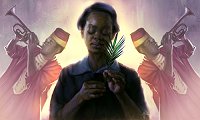 InterGalactic Medicine Show #59, October/November 2017
InterGalactic Medicine Show #59, October/November 2017
“Oba Oyinbo” by Jonathan Edelstein
Reviewed by Filip Wiltgren
Take one part 1930’s colonialism, sprinkle with African references, add a hint of political courtroom drama, and season generously with murder-mystery. Seep in tribal magic and you get “Oba Oyinbo” by Jonathan Edelstein.
“Oba Oyinbo” is very ambitious, no doubt about it, and skillfully executed. However, for me it fails to suspend disbelief—if magic is powerful enough to cast lightning, foul the rifles of an entire regiment, and stop an angry crowd set on premeditated violence from throwing a single punch, why, oh why, isn’t it used by every government and military in the world? I don’t buy it. And that makes the story weak for me. But if you like an African touch without exoticism, and are willing to forgive the plot problems, then you’ll probably enjoy “Oba Oyinbo.”
“The Best of the Three,” by Camila Fernandes, retells the myth of Cerberus, the three-headed dog that guards the kingdom of the dead, from the dog’s perspective. It’s an interesting and fresh take on the myth, and manages to both engage and tug at the heart strings of anyone who cares about dogs.
In “The Sharklings of Anchor Valley” by Kurt Hunt, a family of independent farmers refusing to abandon their home are trapped in flood. However, instead of drowning, they transform into something right out of nightmare.
“The Sharklings of Anchor Valley” is an interesting take on the monster genre. The writing is crisp and flows along nicely, drawing you in. However, it felt like all build-up and no release, the ending leaving me unfulfilled and wondering what the point of the story was. But if you like monsters without madness or horror, then you’re in for a treat.
“The Kids in Town,” by David Williams, takes a look at what it means to be an outcast. In it, a lonesome kid goes to town, and encounters other children for the first time in forever.
Williams plays on themes of otherness, loneliness, and technology, weaving them together around a heart-tugging tale of childhood and nostalgia. The worldbuilding is top-notch, and the emotions ramp up without ever flowing into pity or melodrama. However, the story is a vignette rather than a full tale. To me, it feels like a waste to have such a wonderful world, and not do more with it. I, for one, would have liked to read more of it. As it stands now, “The Kids in Town” feels like a literary dessert, rather than a full meal. But if you want to see a very credible take on our world in some thirty to fifty years’ time, then dive into “The Kids in Town.”
It’s a story we’ve read before; witch dies, three daughters take over. Except two go away, as it isn’t their story, and the remaining one must face the monster in the woods…
In “In the Woods, My Voice,” Rati Mehrotra manages to surprise and bring a fresh take on an age old trope. The story is beautifully written, fast paced, and carried by a very likable protagonist. While the ending is conventional, it comes at the right time and place, capping the experience neatly. If you like to see classic tropes expertly retold, “In the Woods, My Voice” is definitely for you.